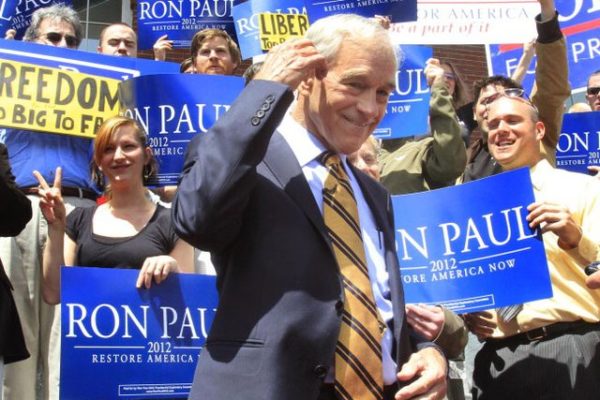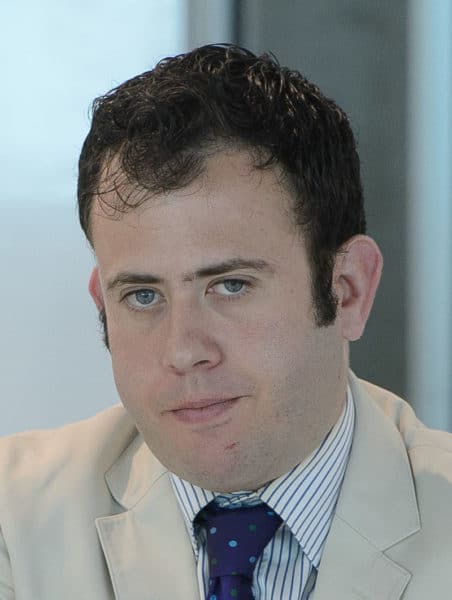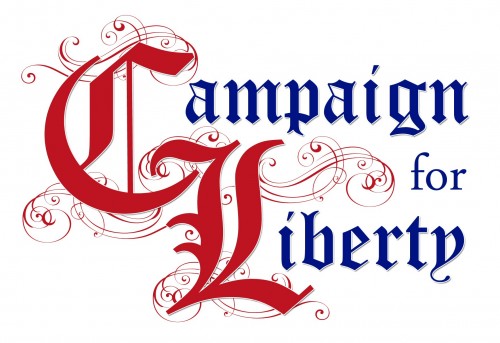Ron Paul was Never the Answer
Greg Hood, American Renaissance, December 2008

Ron Paul was the clear choice of race realists this past election cycle, and the movement he created will be relevant to our aspirations for years to come. No other candidate was able to assemble such a large coalition of political and fundraising support in the face of establishment opposition. That said, white nationalists are kidding themselves if they believe the “Ron Paul Revolution” will push more whites into our camp. At best, it is an opportunity for networking and recruiting. At worst, it could become another pressure group from the Left on issues like mass immigration and racial identity.
Ron Paul’s popularity with the white Right seemed unlikely at the start of the campaign. Many of us looked to Tom Tancredo, chairman of the Immigration Reform Caucus, to become the next Pat Buchanan, and after the crushing defeat of amnesty in the summer of 2007 our movement had hopes for a breakthrough on immigration. Instead, Mr. Tancredo positioned himself as a typical Republican instead of a Middle American champion, and his campaign sputtered. By the time he showed his true colors and began to run ads featuring pictures of Mexican criminals it was too late.
Most white activists instead dedicated themselves to Congressman Ron Paul, a libertarian obstetrician from Texas, whose signature issues were a non-interventionist foreign policy, a return to the gold standard, and abolition of the Federal Reserve. Despite this race-neutral and economics-heavy message, white activists saw in him what they wanted to see: a principled non-conformist who was a heretic on so many issues, they believed he would be a heretic on their issues, too.
This support did not go unnoticed. Thomas Edsell at the Huffington Post called Ron Paul a “magnet in neo-Nazi networks.” The neoconservative blog Little Green Footballs gasped over a “photo-op” Dr. Paul held with Stormfront founder Don Black — though the candidate was only signing autographs at a campaign rally, posing with any supporter who came by.
There were hints that Dr. Paul had racial instincts after all. James Kirchick of The New Republic dug up decades-old articles from the Ron Paul newsletter — almost certainly ghost written — that contained passages about black propensities for crime, rioting, and decidedly un-libertarian voting practices, as well as frank criticism of Martin Luther King and post-apartheid South Africa. Dr. Paul is also closely associated with the paleo-libertarian movement led by men such as Lew Rockwell and Murray Rothbard, which, at least in the past, opposed mass immigration, egalitarianism, and the King cult. However, when confronted with the ancient “racist” newsletters, Dr. Paul retreated to the usual groveling rhetoric about Rosa Parks, Martin Luther King, and the “racist” criminal justice system.

James Kirchik (Credit Image: Heinrich-Böll-Stiftung / Wikimedia)
The danger of Ron Paul, as Mr. Kirchick revealingly phrased it, was that as he was “increasingly permitted inside the boundaries of respectable discourse,” nasty ideas could sneak in with him. The danger seemed especially great because Dr. Paul was bringing in new voters and activists, and was raising more money and gaining more votes than Republican “frontrunners” like Rudolph Giuliani. The Ron Paul Revolution dominated the Internet, won Fox News television polls (to the frustration of Sean Hannity), and seemed to have the promise of a real breakthrough.
Dr. Paul turned out to be much stronger on the Internet than at the ballot box, however. He did take part in a few debates but won no primaries and did not throw his support behind any candidate, incoherently endorsing a third-party movement as a whole that included black leftist Cynthia McKinney. When he finally endorsed Constitution Party and anti-immigration candidate Chuck Baldwin it was too late to have much effect.
Nevertheless, Dr. Paul’s limited electoral success belied his greater accomplishment of inspiring many thousands of activists, who are trying to take over local Republican branches and start campus groups. His long-term impact will depend on what these activists go on to do. Here, race realists will almost certainly be disappointed. The value of a candidate such as Pat Buchanan and, to a lesser degree, Tom Tancredo, lies in an ability to capture the loyalty of mainstream activists, and focus their attention on critical issues such as immigration in ways that push them in our direction. Neither can be called a white nationalist, but both have sparked racial consciousness in many people.
Dr. Paul does not really have this effect. Many of his positions on immigration are sound: He opposes birthright citizenship, amnesty, and welfare for illegals. However, his civil libertarian tendencies led him to oppose workplace enforcement, and he was one of the few Republicans to oppose the SAVE Act, which would have authorized 8,000 more Border Patrol agents, and the reauthorization of E-Verify, which employers use to check employee immigration status.
Dr. Paul sees immigration as nothing more than economics, and believes that if welfare were abolished the problem would go away. Dr. Paul’s new organization, the Campaign for Liberty, doesn’t even mention immigration in its statement of principles, despite the passionate views of so many of his supporters.

In fact, Dr. Paul’s “manifesto,” The Revolution, takes care to condemn “racism” as a “disorder of the heart.” This needn’t mean much — all politicians have to talk that way — but he goes farther: “The only way racism can be overcome is through the philosophy of individualism,” “Government exacerbates racial thinking,” and “We should stop thinking in terms of race.”
This thinking seemed to drive his campaign. Dr. Paul hammered on foreign and monetary policy, but hardly mentioned his opposition to welfare, birthright citizenship, and affirmative action, even though these are the positions that are popular with the Republican base. As a result, rather than a threat to multiculturalism, the establishment sees him as an eccentric congressman with whom it agrees on legalizing drugs and stopping the war in Iraq, but whom it mocks for his nutty ideas about the Federal Reserve.
It is too early to know what path it will take, but Dr. Paul’s Campaign for Liberty is at best a vehicle for limited government rather than a way to build a real resistance on cultural and racial issues. Young Americans for Liberty, the youth wing of the Ron Paul movement with more than 30 chapters, has members with widely varying ideological beliefs. Some would be quite comfortable with American Renaissance, while others are hardcore “anti-racists.” Time will tell whether these young libertarians will confront controversial issues like diversity, affirmative action, and identity politics on campus. They may show no more backbone than the paleolibertarians, who are so afraid of attacks by the likes of Mr. Kirchick that they are tempted to abandon fundamental questions of immigration and race, and limit themselves to a safe — and ultimately ineffective — focus on free markets and policy wonkery.
Nevertheless, Dr. Paul’s campaign created opportunities for us. He introduced ideas that had never been heard in the political discussion and that are clearly relevant to race realists. Opposition to welfare that disproportionately benefits minorities, states’ rights, gun rights, and an America-First foreign policy are important issues. Principled, libertarian opposition to racial preferences and anti-discrimination laws is commendable, and Dr. Paul deserves credit as the lone congressman to vote against commemorating the Civil Rights Act.
In practical terms, though, this is not much help. It is not useful to funnel right-wingers angry at a system that dispossess whites into a movement about abstract rights and atomized individuals. All politics are fundamentally identity politics, and Dr. Paul’s refuge in theory means he has abandoned the white constituency. He becomes not a leader, but a mildly interesting philosopher who is harmless to the left-wing establishment
There is no institution coming out of Dr. Paul’s movement that is systematically pushing people in our direction, nor will he be a leader for our cause. His followers are willing to think outside the box, and may already be sympathetic towards us, so we must engage them, but race realists must be careful not to waste time and energy on futile libertarian crusades. We must mine this community for recruits, but not be co-opted by it.
The challenge for us is to develop the constituency that will support our movement. The vast majority of that constituency will be found in the “implicit whiteness” of the Republican Party, and that is the group we must swing to our side. We are more likely to do that with issues that normal Republicans care about, such as amnesty or affirmative action, than we are with lectures on the evils of the Federal Reserve. Whites on the brink of dispossession need at least implicit defenders who can lead to an explicit movement to defend our people. Ron Paul is not that defender.















